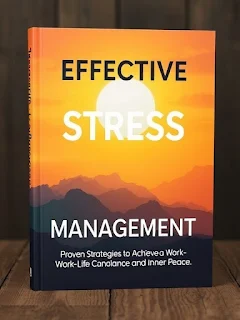Effective Stress Management: Proven Strategies to Achieve Work-Life Balance and Inner Peace
Effective Stress Management: Proven Strategies to Achieve Work-Life Balance and Inner Peace
Introduction
Stress is an inevitable part of life, but it doesn't have to control you. Left unchecked, it can lead to burnout, decreased productivity, and emotional fatigue. This blog explores proven strategies to help you manage stress effectively, find balance, and improve your emotional well-being.
In this guide, you'll learn actionable tips to improve work-life balance, recognize and address burnout, and master relaxation techniques that nurture mental health.
Understanding Stress: Causes and Impact
Stress is the body's natural response to challenging situations, triggering physical, emotional, and mental reactions. While some stress is beneficial in motivating performance, chronic stress can adversely affect health and happiness.
- Common Stress Triggers: Deadlines, financial issues, personal relationships, and health concerns.
- Impact: Stress contributes to fatigue, anxiety, insomnia, and decreased productivity.
Strategies for Managing Stress
Work-Life Balance Tips
- Prioritize Tasks: Use tools like the Eisenhower Matrix to distinguish between urgent and non-urgent tasks.
- Set Boundaries: Define work hours and unplug after work to protect personal time.
- Schedule Relaxation: Plan regular breaks and time for hobbies or family activities.
Burnout Prevention
Burnout occurs when prolonged stress exhausts your emotional and physical resources. Recognizing early signs is key to prevention.
- Recognize the Signs: Persistent fatigue, irritability, and detachment are red flags.
- Practice Mindfulness: Incorporate mindfulness exercises, such as deep breathing or meditation, into your daily routine.
- Seek Support: Talk to a counselor or join a support group to share your experiences.
Relaxation Techniques
Relaxation is essential for stress management. These techniques can help you unwind and refocus:
- Yoga: Engage in yoga sessions to combine physical movement with mental relaxation.
- Journaling: Write down thoughts and feelings to gain clarity and reduce mental clutter.
- Progressive Muscle Relaxation: Gradually tense and relax muscle groups for a calming effect.
Advanced Techniques for Stress Relief
- Cognitive Behavioral Therapy (CBT): Understand and reframe negative thought patterns.
- Gratitude Journaling: Record positive experiences daily to shift focus from stress to gratitude.
- Exercise: Physical activity releases endorphins that reduce stress and improve mood.
Overcoming Challenges in Implementing Stress Management
Time constraints and lack of motivation can hinder stress management. Here’s how to address these obstacles:
- Lack of Time: Start with short, manageable stress-relief practices like 5-minute breathing exercises.
- Motivation: Set realistic goals and track progress to stay encouraged.
- Resources: Explore free apps like Headspace or Calm for guided mindfulness sessions.
Case Studies and Expert Insights
Consider Jane, a marketing executive who faced chronic stress. By implementing mindfulness and progressive relaxation techniques, she reduced stress by 60% in just three months.
According to Dr. Smith, a wellness expert, “Stress management is a skill. Regular practice of relaxation techniques significantly improves mental health.”
FAQs
- How can I manage stress while working remotely? Schedule regular breaks, maintain a routine, and create a dedicated workspace.
- What is the best way to handle emotional burnout? Recognize early signs, seek support, and practice self-care techniques like yoga or journaling.
- Are there quick stress relief methods I can use during work? Yes, try deep breathing exercises or short walks to reset your focus.
Conclusion
Stress is a part of life, but you can manage it with the right strategies. Whether through mindful relaxation, setting boundaries, or practicing gratitude, these methods empower you to take control of your well-being.
Call to Action
Take charge of your stress today! Subscribe to our newsletter for more actionable tips on achieving inner peace and emotional growth.





Comments
Post a Comment